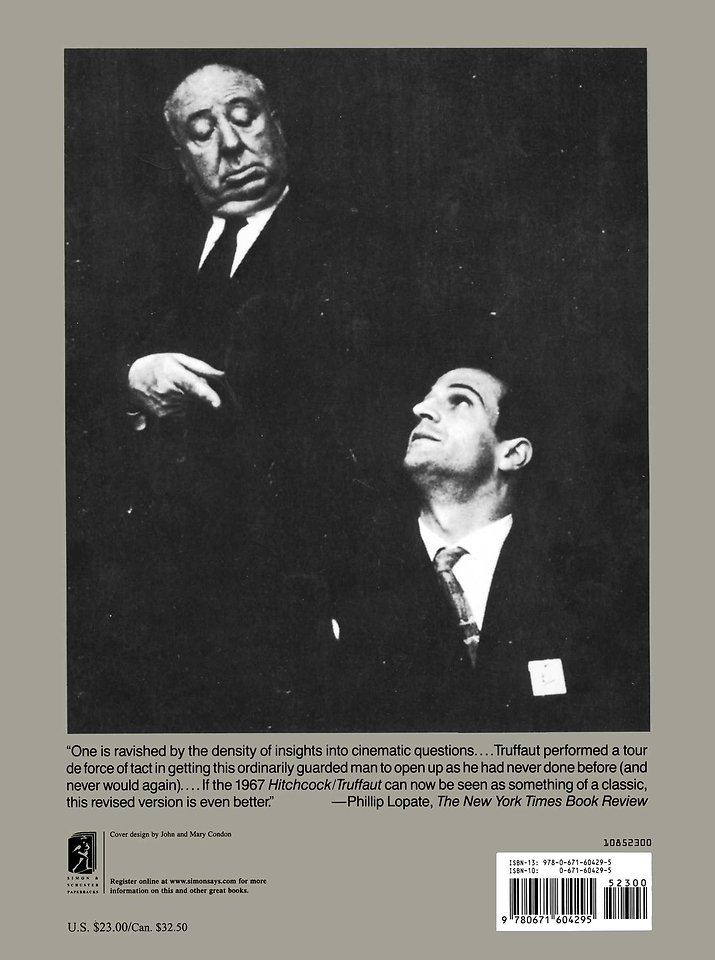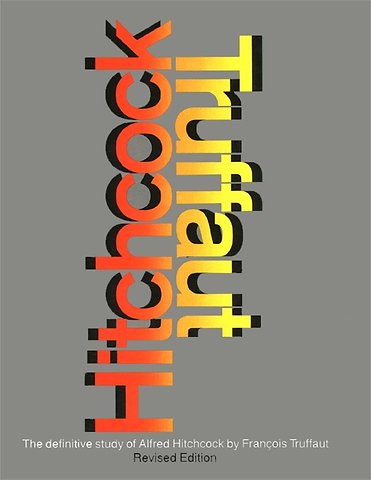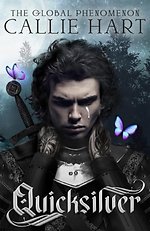<B>CONTENTS</B><BR><BR>Preface to the Revised Edition<BR><BR>Introduction<BR><BR>1: Childhood<BR><BR>Behind prison bars<BR><BR>"Came the dawn"<BR><BR>Michael Balcon<BR><BR><I>Woman to Woman<BR><BR>Number Thirteen</I><BR><BR>Introducing the future Mrs. Hitchcock<BR><BR>A melodramatic shooting: <I>The Pleasure Garden<BR><BR>The Mountain Eagle</I><BR><BR>2: The first true Hitchcock: <I>The Lodger</I><BR><BR>Creating a purely visual form<BR><BR>The glass floor<BR><BR>Handcuffs and sex<BR><BR>Why Hitchcock appears in his films<BR><BR><I>Downhill<BR><BR>Easy Virtue<BR><BR>The Ring</I> and One-Round Jack<BR><BR><I>The Farmer's Wife</I><BR><BR>The Griffith influence<BR><BR><I>Champagne</I><BR><BR>The last silent movie: <I>The Manxman.</I><BR><BR>3: Hitchcock's first sound film: <I>Blackmail</I><BR><BR>The Shuftan process<BR><BR><I>Juno and the Paycock</I><BR><BR>Why Hitchcock will never film <I>Crime and Punishment</I><BR><BR>What is suspense?<BR><BR>Murder<BR><BR><I>The Skin Game<BR><BR>Rich and Strange</I><BR><BR>Two innocents in Paris<BR><BR><I>Number Seventeen</I><BR><BR>Cats, cats everywhere<BR><BR><I>Waltzes from Vienna</I><BR><BR>The lowest ebb and the comeback.<BR><BR>4. <I>The Man Who Knew Too Much</I><BR><BR>When Churchill was chief of police<BR><BR><I>M</I><BR><BR>From "The One Note Man" to the deadly cymbals<BR><BR>Clarification and simplification<BR><BR><I>The Thirty-nine Steps</I><BR><BR>John Buchan's influence<BR><BR>Understatement<BR><BR>An old, bawdy story<BR><BR>Mr. Memory<BR><BR>Slice of life and slice of cake<BR><BR>5. <I>The Secret Agent</I><BR><BR>You don't always need a happy ending<BR><BR>What do they have in Switzerland?<BR><BR><I>Sabotage</I><BR><BR>The child and the bomb<BR><BR>An example of suspense<BR><BR><I>The Lady Vanishes</I><BR><BR>The plausibles<BR><BR>A wire from David O. Selznick<BR><BR>The last British film: <I>Jamaica Inn</I><BR><BR>Some conclusions about the British period.<BR><BR>6: <I>Rebecca:</I> A Cinderella-like story<BR><BR>"I've never received an Oscar"<BR><BR><I>Foreign Correspondent</I><BR><BR>Gary Cooper's mistake<BR><BR>In Holland, windmills and rain<BR><BR>The bloodstained tulip<BR><BR>What's a MacGuffin?<BR><BR>Flashback to <I>The Thirty-nine Steps<BR><BR>Mr. and Mrs. Smith</I><BR><BR>"All actors are cattle"<BR><BR><I>Suspicion</I><BR><BR>The luminous glass of milk<BR><BR>7: <I>Sabotage versus Saboteur</I><BR><BR>A mass of ideas clutters up a picture<BR><BR><I>Shadow of a Doubt</I><BR><BR>Tribute to Thornton Wilder<BR><BR>"The Merry Widow"<BR><BR>An idealistic killer<BR><BR><I>Lifeboat</I><BR><BR>A microcosm of war<BR><BR>Like a pack of dogs<BR><BR>Return to London<BR><BR>Modest war contribution: <I>Bon Voyage</I> and <I>Aventure Malgache.</I><BR><BR>8: Return to America<BR><BR><I>Spellbound</I><BR><BR>Collaboration with Salvador Dali<BR><BR><I>Notorious</I><BR><BR>"The Song of the Flame"<BR><BR>The uranium MacGuffin<BR><BR>Under surveillance by the FBI<BR><BR>A film about the cinema<BR><BR><I>The Paradine Case</I><BR><BR>Can Gregory Peck play a British lawyer?<BR><BR>An intricate shot<BR><BR>Horny hands, like the devil!<BR><BR>9: <I>Rope:</I> From 7:30 to 9:15 in one shot<BR><BR>Clouds of spun glass<BR><BR>Colors and shadows<BR><BR>Walls that fade away<BR><BR>Films must be cut<BR><BR>How to make noises rise from the street<BR><BR><I>Under Capricorn</I><BR><BR>Infantilism and other errors in judgment<BR><BR>Run for cover!<BR><BR>"Ingrid, it's only a movie!"<BR><BR><I>Stage Fright</I><BR><BR>The flashback that lied<BR><BR>The better the villain, the better the picture<BR><BR>10: Spectacular comeback via <I>Strangers on a Train</I><BR><BR>A monopoly on the suspense genre<BR><BR>The little man who crawled<BR><BR>A bitchy wife<BR><BR><I>I Confess</I><BR><BR>A "barbaric sophisticate"<BR><BR>The sanctity of confession<BR><BR>Experience alone is not enough<BR><BR>Fear of the police<BR><BR>Story of a <I>ménage á trois</I><BR><BR>11: <I>Dial M for Murder</I><BR><BR>Filming in 3-D<BR><BR>The theater confines the action<BR><BR><I>Rear Window</I><BR><BR>The Kuleshov experiment<BR><BR>We are all voyeurs<BR><BR>Death of a small dog<BR><BR>The size of the image has a dramatic purpose<BR><BR>The surprise kiss versus the suspense kiss<BR><BR>The Patrick Mahon case and the Dr. Crippen case<BR><BR><I>To Catch a Thief</I><BR><BR>Sex on the screen<BR><BR><I>The Trouble with Harry</I><BR><BR>The humor of understatement<BR><BR><I>The Man Who Knew Too Much</I><BR><BR>A knife in the back<BR><BR>The clash of cymbals<BR><BR>12: <I>The Wrong Man</I><BR><BR>Absolute authenticity<BR><BR><I>Vertigo</I><BR><BR>The usual alternatives: suspense or surprise<BR><BR>Necrophilia<BR><BR>Kim Novak on the set<BR><BR>Two projects that were never filmed<BR><BR>A political suspense movie<BR><BR><I>North by Northwest</I><BR><BR>The importance of photographic documentation<BR><BR>Dealing with time and space<BR><BR>The practice of the absurd<BR><BR>The body that came from nowhere<BR><BR>13: Ideas in the middle of the night<BR><BR>The longest kiss in screen history<BR><BR>A case of pure exhibitionism<BR><BR>Never waste space<BR><BR>Screen imagery is make-believe<BR><BR><I>Psycho</I><BR><BR>Janet Leigh's brassière.<BR><BR>Red herrings<BR><BR>Directing the audience<BR><BR>How Arbogast was killed<BR><BR>A shower stabbing<BR><BR>Stuffed birds<BR><BR>How to get mass emotions<BR><BR><I>Psycho:</I> A film-maker's film<BR><BR>14: <I>The Birds</I><BR><BR>The elderly ornithologist<BR><BR>The gouged-out eyes<BR><BR>The girl in a gilded cage<BR><BR>Improvisations<BR><BR>The size of the image<BR><BR>The scene that was dropped<BR><BR>An emotional truck<BR><BR>Electronic sounds<BR><BR>Practical jokes<BR><BR>15: <I>Marnie</I><BR><BR>A fetishist love<BR><BR><I>The Three Hostages, Mary Rose,</I> and <I>R.R.R.R.<BR><BR>Torn Curtain</I><BR><BR>The bus is the villain<BR><BR>The scene in the factory<BR><BR>Every film is a brand-new experience<BR><BR>The rising curve<BR><BR>The situation film versus the character film<BR><BR>"I only read the London <I>Times"</I><BR><BR>A strictly visual mind<BR><BR>Hitchcock a Catholic film-maker?<BR><BR>A dream for the future: A film showing twenty-four hours in the life of a city<BR><BR>16: Hitchcock's final years<BR><BR>Grace Kelly abandons the cinema<BR><BR>More on <I>The Birds, Marnie,</I> and <I>Torn Curtain</I><BR><BR>Hitch misses the stars<BR><BR>The "great flawed films"<BR><BR>A project that was dropped<BR><BR><I>Topaz</I> made to order for the front office<BR><BR>Return to London with <I>Frenzy</I><BR><BR>The pacemaker and <I>Family Plot</I><BR><BR>Hitchcock laden down with tributes and honors<BR><BR>Love and espionage<BR><BR><I>The Short Night</I><BR><BR>Hitchcock is ill, Sir Alfred is dead<BR><BR>The end<BR><BR>The Films of Alfred Hitchcock<BR><BR>Selected Bibliography<BR><BR>Index of Film Titles<BR><BR>Index of Names









